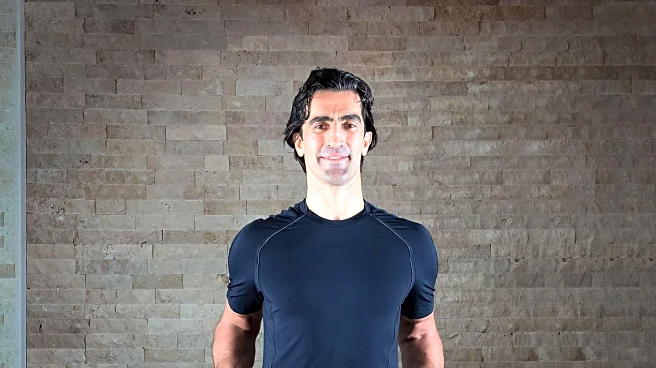What's Happening?
Pilates, particularly the reformer version, is experiencing a resurgence in popularity. Originally developed by Joseph Pilates in the 1920s to aid injured soldiers, reformer Pilates uses a machine to provide resistance and support. This workout has become increasingly popular, with Google searches for reformer Pilates growing since 2022. Pilates is known for improving core strength, flexibility, and balance, and can also aid in stress relief and mental health. Despite its benefits, Pilates has been associated with societal body standards, often seen as a workout for achieving a 'long and lean' physique. This perception is linked to cultural and political shifts, reflecting changing ideals of female body standards.
Why It's Important?
The renewed interest in reformer Pilates highlights broader societal trends regarding body image and fitness. As body standards evolve, Pilates aligns with the current preference for a toned yet natural physique. This trend is significant as it reflects cultural shifts and the influence of social media on fitness practices. Pilates offers real health benefits, but its association with achieving a specific body type underscores ongoing issues with body image and societal expectations. The popularity of Pilates may impact the fitness industry, driving demand for classes and equipment, and influencing how exercise is marketed and perceived.
What's Next?
As reformer Pilates continues to gain traction, fitness studios may expand offerings to meet demand. The trend could lead to increased accessibility and affordability of Pilates classes, potentially attracting a more diverse clientele. Additionally, the focus on body image may prompt discussions about inclusivity and the importance of exercise for health rather than appearance. Stakeholders in the fitness industry might explore ways to promote Pilates as a holistic practice, emphasizing its mental and physical benefits beyond aesthetics.
Beyond the Headlines
The rise of reformer Pilates also raises questions about the intersection of fitness and politics. The workout's popularity during a politically conservative era suggests a cultural return to traditional ideals of femininity and body standards. This development may influence how exercise is perceived and practiced, highlighting the complex relationship between fitness, societal norms, and personal identity. As Pilates evolves, it may challenge or reinforce existing narratives about body image and health.










